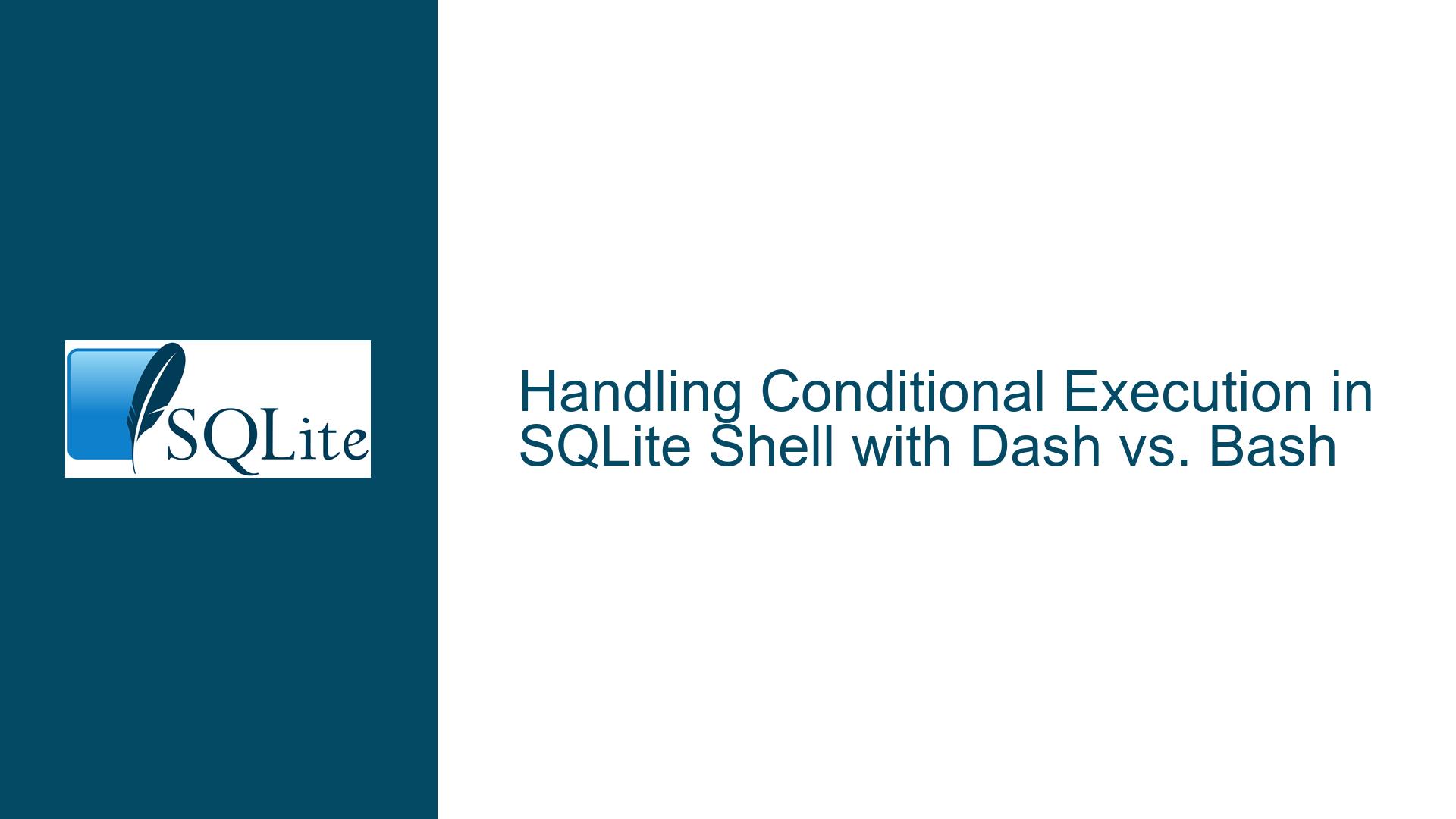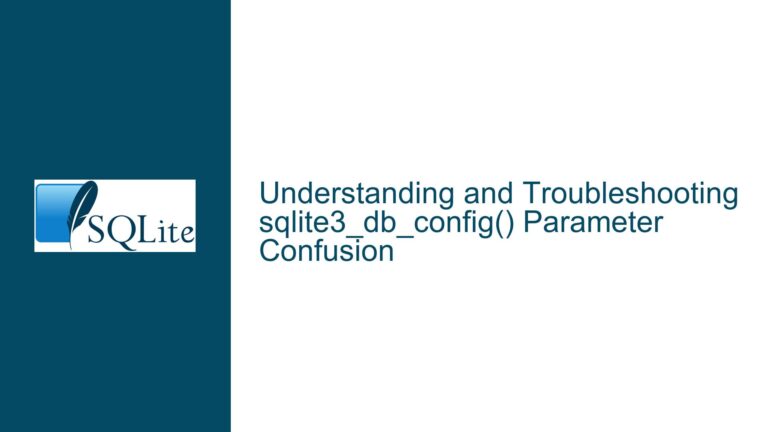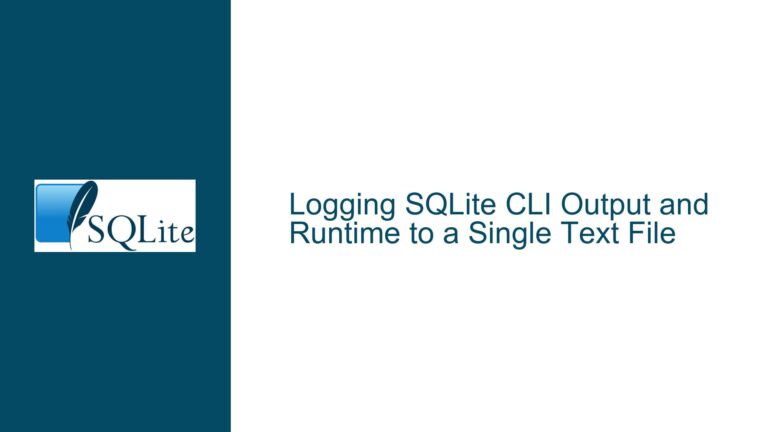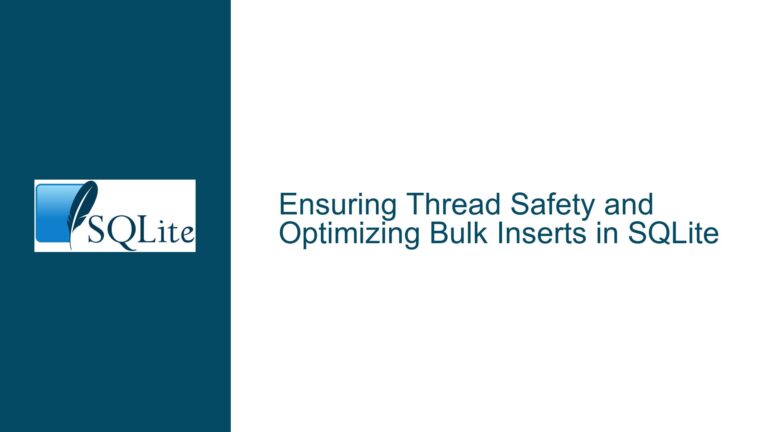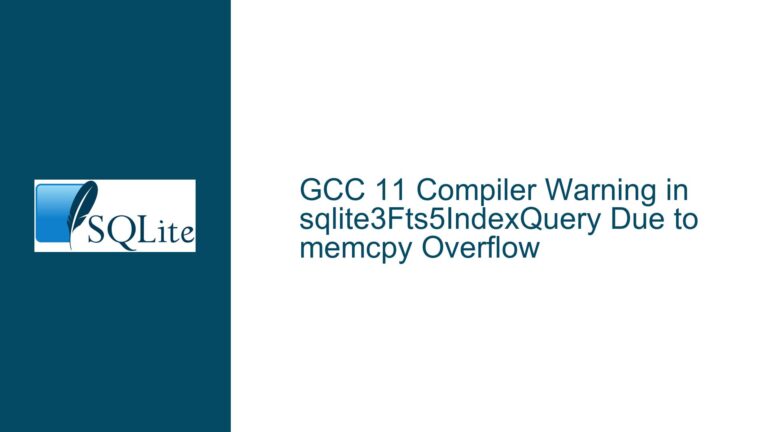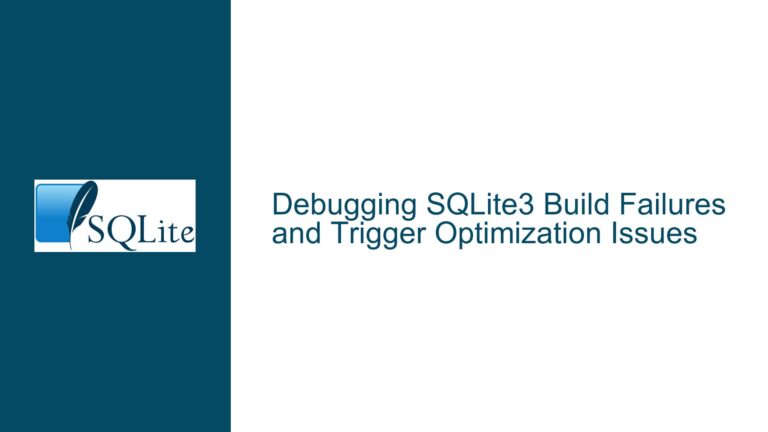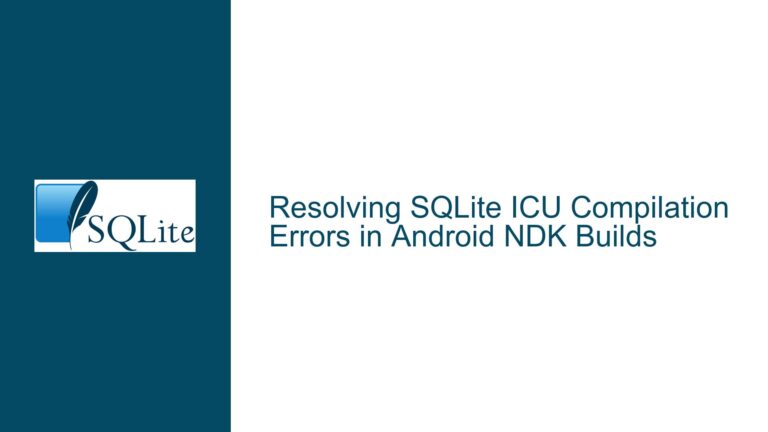Handling Conditional Execution in SQLite Shell with Dash vs. Bash
Conditional Execution in SQLite Shell Failing Due to Dash Shell Limitations
The core issue revolves around attempting to execute conditional logic within the SQLite shell using the .shell meta-command. The user intends to use Bash-specific constructs, such as the double-bracket [[ syntax, for conditional evaluations. However, the SQLite shell defaults to using /bin/dash as the underlying shell, which does not support the [[ construct. This limitation results in syntax errors and failed executions when attempting to use Bash-specific features within the .shell command.
The user’s environment includes Ubuntu 18.04.5 LTS, SQLite version 3.35.0, and the Fossil SCM shell, which also relies on SQLite. The primary challenge is that the .shell meta-command defers to the system’s default shell, which in this case is /bin/dash. Dash is a lightweight, POSIX-compliant shell that lacks many of the extended features found in Bash, such as the [[ compound command. This discrepancy leads to errors when attempting to execute Bash-specific logic directly within the SQLite shell.
The user’s attempts to force the use of /bin/bash within the .shell command have been unsuccessful due to issues with variable expansion and syntax errors. Additionally, the user has encountered peculiar behavior with the [ (single-bracket) test command, where the presence or absence of spaces affects the execution of commands. This behavior further complicates the task of implementing conditional logic within the SQLite shell.
Interrupted Shell Execution Due to Dash’s POSIX Compliance
The root cause of the issue lies in the difference between Bash and Dash shells. Bash is a feature-rich shell that supports extended syntax, such as the [[ construct, which allows for more complex conditional evaluations. Dash, on the other hand, is a minimalistic shell designed for speed and POSIX compliance. It does not support the [[ construct and has limited support for advanced string manipulation and conditional logic.
When the .shell meta-command is used in SQLite, it relies on the system() C library call, which typically invokes the system’s default shell, /bin/sh. On many Linux distributions, including Ubuntu, /bin/sh is a symbolic link to /bin/dash. This means that any shell commands executed via .shell are interpreted by Dash, leading to errors when Bash-specific syntax is used.
The user’s attempts to explicitly invoke /bin/bash within the .shell command have failed due to improper handling of command arguments and variable expansion. For example, the following command fails because the -c option expects a single argument, but the command string is not properly formatted:
sqlite> .shell /bin/bash -c 'fin=file1.doc ; [[ "${fin##*.}" = "doc" ]] ; echo "$?\n${fin##*.}" ; echo "$fin"' ;
This results in a syntax error because the [[ construct is not recognized by Dash, and the command string is not correctly parsed by Bash due to improper escaping and argument handling.
Additionally, the user has observed inconsistent behavior with the [ (single-bracket) test command, where the presence or absence of spaces affects the execution of commands. For example:
sqlite> .shell fin=file1.doc ; [ "${fin##*.}" = "doc" ] ; echo "$?\n${fin##*.}" ; echo "$fin" ;
This command works correctly when there is a space before the doc string, but fails when the space is omitted. This behavior is due to Dash’s strict interpretation of the [ command, which requires proper spacing and syntax to function correctly.
Implementing Shell Scripts and PRAGMA journal_mode for Robust Conditional Execution
To address the issue of conditional execution within the SQLite shell, several approaches can be taken. The most straightforward solution is to avoid using Bash-specific constructs within the .shell command and instead rely on POSIX-compliant syntax. However, if advanced conditional logic is required, it is recommended to use external shell scripts or invert the control flow by calling SQLite from a shell script.
Using External Shell Scripts
One effective solution is to generate a shell script from within the SQLite shell and then execute it using the desired shell (e.g., /bin/bash). This approach allows for the use of Bash-specific features while avoiding the limitations of the .shell meta-command. The following steps outline this process:
Generate the Shell Script: Use the
.outputmeta-command to write the shell script to a temporary file. For example:sqlite> .output /tmp/furd sqlite> .print fin=file1.doc sqlite> .print [[ \"${fin##*.}\" = \"doc\" ]] sqlite> .print echo \"$?\n${fin##*.}\" sqlite> .print echo \"$fin\" sqlite> .output stdoutThis creates a temporary script file (
/tmp/furd) containing the desired shell commands.Make the Script Executable: Use the
.shellmeta-command to set the executable permission on the script:sqlite> .shell chmod +x /tmp/furdExecute the Script: Use the
.shellmeta-command to execute the script with the desired shell (e.g.,/bin/bash):sqlite> .shell /bin/bash -c /tmp/furdClean Up: Remove the temporary script file after execution:
sqlite> .shell rm /tmp/furd
This approach allows for the use of advanced Bash features while avoiding the limitations of the .shell meta-command.
Inverting the Control Flow
Another approach is to invert the control flow by calling SQLite from a shell script. Instead of embedding shell commands within the SQLite shell, the shell script can drive the SQLite commands. This approach provides greater flexibility and avoids the limitations of the .shell meta-command. For example:
#!/bin/bash
fin=file1.doc
if [[ "${fin##*.}" = "doc" ]]; then
echo "File is a DOC file"
else
echo "File is not a DOC file"
fi
# Execute SQLite commands
sqlite3 mydatabase.db "SELECT * FROM mytable;"
This script uses Bash-specific features to perform conditional logic and then calls SQLite to execute database commands. This approach separates the shell logic from the SQLite commands, making the code easier to maintain and debug.
Using PRAGMA journal_mode for Robustness
In addition to addressing the shell execution issue, it is important to ensure the robustness of the SQLite database, especially when performing complex operations that involve external scripts. The PRAGMA journal_mode command can be used to control the journaling mode of the SQLite database, which affects how transactions are handled and how the database recovers from crashes or power failures.
For example, setting the journal mode to WAL (Write-Ahead Logging) can improve performance and reliability:
PRAGMA journal_mode=WAL;
This mode allows for concurrent reads and writes, making it suitable for environments where multiple processes or scripts interact with the database.
Summary of Solutions
| Solution | Description | Pros | Cons |
|---|---|---|---|
| External Shell Scripts | Generate and execute shell scripts from within SQLite | Allows use of Bash-specific features | Requires temporary files and cleanup |
| Inverting Control Flow | Call SQLite from a shell script | Separates shell logic from SQLite commands | Requires external script management |
| PRAGMA journal_mode | Set journal mode to improve database robustness | Improves performance and reliability | Does not directly address shell execution |
By implementing these solutions, users can overcome the limitations of the .shell meta-command and achieve robust conditional execution within their SQLite workflows.
